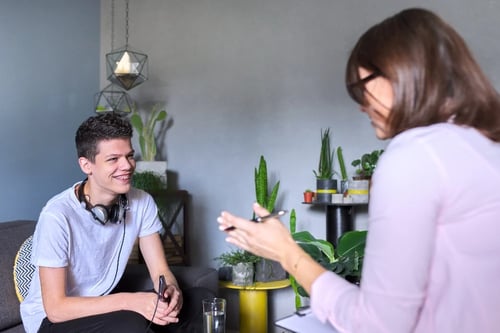Coping Skills for Self-Harm
5 Effective Strategies to Help Your Teen
Discovering that your teen is intentionally harming themselves can be frightening and confusing for any parent. Self-harm is a complex issue with no singular cause - teens engage in this behavior for varied reasons, including as a means to cope with overwhelming negative emotions and thoughts.

Table Of Content
- Identify Triggers and Warning Signs
- Build a Coping Skills Toolbox
- Get Support from Caring Adults
- Challenge Negative Thought Patterns
- Take Care of Overall Health
The good news is that self-harm can be overcome with compassion, support, and by teaching more adaptive coping mechanisms. As a parent, you are in a unique position to help guide your teen towards healthier strategies. Here are 5 of the most effective coping skills for self-harm that you can share with your adolescent:
Identify Triggers and Warning Signs
Pay attention to situations, feelings, or thoughts that seem to precede your teen’s urge to self-harm. Keeping a mood journal can help uncover personal triggers. Common triggers include interpersonal problems, academic stress, depression, anxiety, self-criticism, and anger. Learning to recognize their individual warning signs, like isolation, changes in sleep or appetite, or talk of harming themselves, can help your teen take preventative steps when these issues arise.
Build a Coping Skills Toolbox
Build a Coping Skills Toolbox
Equip your teen with go-to alternatives they can utilize when experiencing triggers or urges. Useful coping mechanisms may include activities that release endorphins, creative outlets like writing or art, relaxation skills such as deep breathing, yoga, or progressive muscle relaxation, and positive distractions like spending time outdoors, reading, or listening to uplifting music. Have your teen compile customized lists of activities, resources, inspirational quotes, and support people they can access in moments of crisis.
Get Support from Caring Adults
Get Support from Caring Adults
Don’t underestimate the healing power of personal connection. Encourage your teen to identify trustworthy adults, whether family members, teachers, faith leaders, or counselors, who they feel comfortable opening up to when they’re struggling. Schedule regular check-ins focused on emotional health rather than self-harm behaviors. Counseling can also teach healthy communication and provide additional coping strategies tailored to your teen’s needs.
Challenge Negative Thought Patterns
Challenge Negative Thought Patterns
Teens who self-harm often struggle with intense self-criticism, hopelessness, and inaccurate beliefs about themselves and their future. Help your teen identify and reframe unhealthy thought patterns. Ask them questions to reveal flaws in their thinking. Express love and acceptance, highlight strengths and positive qualities that contradict these negative self-perceptions, and redirect their focus towards evidence that things can and will get better.
Take Care of Overall Health
Take Care of Overall Health
It’s essential not to overlook the foundation of wellbeing. Ensure your teen gets sufficient sleep and nutrition, regular physical activity, time outdoors and away from excessive screen time, and opportunities for social connection. Maintaining healthy rhythms can help stabilize their mood, boost self-esteem, and reduce impulsive behaviors. Promote positive lifestyle choices by modeling self-care in your own life as well.
Healing from self-harm requires patience, compassion, and a non-judgmental presence. Avoid ultimatums, frustrated reactions, and communicating disappointment or disgust at your teen’s struggles. Punishment usually backfires by heightening distress. Rather, remain calm and convey unconditional support.
The fact that your teen has shared their pain with you is a courageous step towards health and recovery. Let them know you are fully committed to helping them through this challenge. With consistent emotional support, motivation, and access to healthy coping alternatives, your adolescent can overcome self-harm and gain resilience that serves them throughout life. The strategies above are powerful tools not just for crisis intervention, but for laying the groundwork for lifelong mental health and wellness.
Let Idaho Youth Ranch help your teen
Teen Counseling
Our masters-educated and trained therapists and counselors have the experience your young person needs to find healing.
Family Counseling
Idaho Youth Ranch can help your family reconnect, open up lines of communication, and build more positive relationships.
Group Counseling
Group therapy helps young people, ages 9 to 24, to address trauma, dangerous behaviors, troubling feelings or experiences.
Equine Therapy
Working with horses has been a proven method of emotional recovery and one of the unique services offered by Idaho Youth Ranch.


.webp?width=500&height=334&name=Idaho%20Youth%20Ranch%20Family%20Counseling%20(1).webp)

